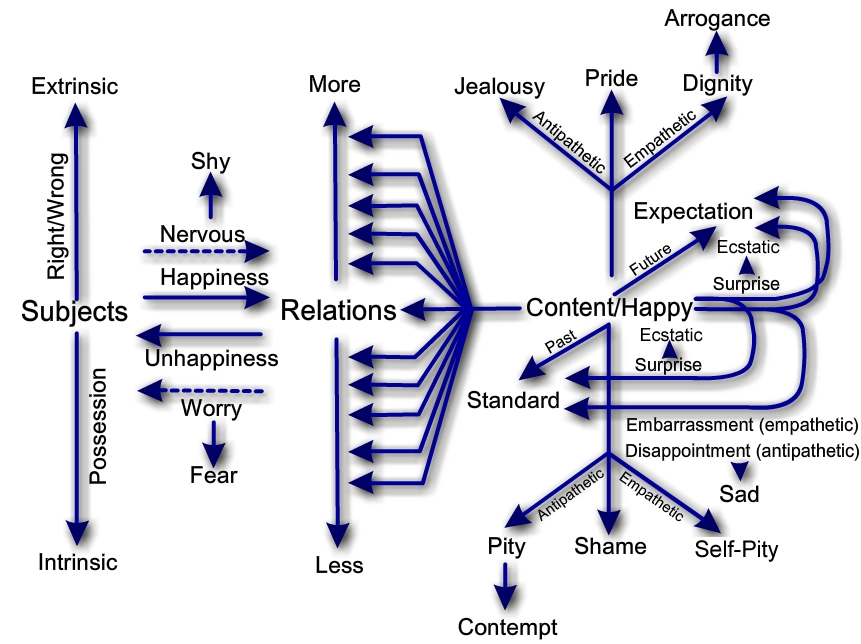Unlike theism which is imaginary and atheism which is nothing this worldview actually exists in the field. It is based on subjects and relations which have the highest conceptual scope of all words. It conforms with evolution theory, includes the definitions for right, wrong, happiness and love, and it has a moral code. It also has a diagram.
This is an issue that goes back to the middle ages:
http://plato.stanford.edu/entries/relations-medieval
http://www.humanities.mq.edu.au/Ockham/z3609.html
The failure of the medieval philosophers to solve this problem is the reason why I believe we are at war.
Relations can be composed of units, objects or subjects. The relations of units is mathematics. The relations of objects is engineering. The relations of subjects is a worldview.

Some of these items are not in the diagram, not everything can be drawn.
Subject - a cross-utilized unit of a relation
Relation - more than one subject combined together
Extrinsic Subject - subject given to a relation
Intrinsic Subject - subject contained in a relation
Right - if a subject is within an extrinsic subject
Wrong - if a subject is not within an extrinsic subject
Possession - if an intrinsic subject is within a subject
Good - what increases a relation
Bad - what hinders or decreases a relation
Horror - excessive Bad
Serious - being within an extrinsic subject, also known as relevant
Silly - happiness that is not within an extrinsic subject
Crazy - if an extrinsic subject is ambiguous
Confusion - if the choice of an extrinsic subject is ambiguous
Value - direction of a relation
Like - to share Values
Happiness - occurs if subjects combine and form a relation. There are five different types of happiness. In order to include non-social relations in these definitions, the generic term combination is used symbolized with the letter 'C'.
1stC - occurs when subjects combine and a relation is formed. Here the extrinsic subject is created. The terms 'more' and 'less' do not apply with 1stC. It is very important to clarify that with 1stC one does not say, "Happiness is the combination of subjects," but, "Happiness occurs if subjects combine and form a relation."
2ndC - occurs when subjects are combined to an existing relation. Here the extrinsic subject already exists. The terms 'more' and 'less' apply with 2ndC. Leverage and contentment exist because of 2ndC.
3rdC - occurs as the back and forth dynamics between relations. Here more than one extrinsic subject is involved.
Leverage - resembles a lever, the relative lowering of a subject in a relation causes the relative increase of the other related subjects. This also is known as antipathetic happiness. Subjects on opposite sides of the lever are antipathetic to each other. An examples of this is kidding.
Contentment - is a relative position a subject has in a relationship. This position is what we mean when we say we are "happy". Another term that applies here is "fashion". Fashion is the active form of contentment. This type of happiness is personal and can be stronger than 1stC. Some sub-emotions of contentment are:
Enjoyment - having what you want (having what gives you contentment) *
Grief - not having what you want *
Frustration - not getting what you want
Anger - extreme Frustration
Distress - having what you don't want*
Relief - not having what you don't want*
Unhappiness is, of course, the converse but with separation instead of combination.
Sorry - empathetic Unhappiness
Regret - the action toward Sorry
Gratitude - the action toward antipathetic Happiness
Forgive - declaring Unhappiness to be irrelevant
Blame - declaring Unhappiness to be relevant
Nervous - anticipation of a combination
Shy - extreme Nervousness
Worry - anticipation of a separation
Concern - mild Worry
Fear - extreme Worry
Terror - extreme Fear
Anxiety - general term for Nervous, Shy, Worry, Concern, Fear or Terror
Pride - above Contentment
Shame - below Contentment
Dignity - empathetic Pride
Arrogance, Conceit - extreme Dignity
Honor - the action toward Dignity
Jealousy - antipathetic Pride
Envy - the action toward Jealousy
Respect - antipathetic Pride related to Fashion
Admiration - the action toward Respect
Modesty - empathetic Shame
Humility - the action toward Modesty
Pity - antipathetic Shame
Contempt - extreme Pity
Disgust - the action toward Pity
Expectation - future Contentment
Hope - the action toward Expectation (to want a future Contentment)
Standard - past Contentment
Surprise - empathetically or antipathetically above Standard or Expectation
Embarrassment - empathetically below Standard or Expectation
Disappointment - antipathetically below Standard or Expectation
Ecstatic - extreme Surprise
Sadness - extreme Disappointment or Embarrassment
Hate - extreme antipathy
Love - extreme empathy
Miss - absent empathy
Axiom: Extrinsic subjects can never be related intrinsic subjects. Such an event would instantly cause a new extrinsic subject to exist. This is called "The League Rule" or "The Authority Rule."
Axiom: Related subjects do not combine for the same reason that unrelated subjects do not separate. This is called "The Base Rule". It is a significant factor in physical morality.
*The definitions for Enjoyment, Grief, Distress and Relief are from I. Roseman 1984. Cognitive determinants of emotion: a structured theory. In P. Shaver (ed.), Review of personality and social psychology (Vol. 5: Emotions, relationships, and health). Beverly-Hills: Sage, 11-36.
This is a system that is common to us all. It is not only about the mind but it is about the body as well. We are all subjects and we all have relatives. It can easily be proved in the same that a whole is composed of parts or the many is composed of ones. All that needs to be done is to include it in academic philosophy. This is the only solution for world peace. No other words are possible.